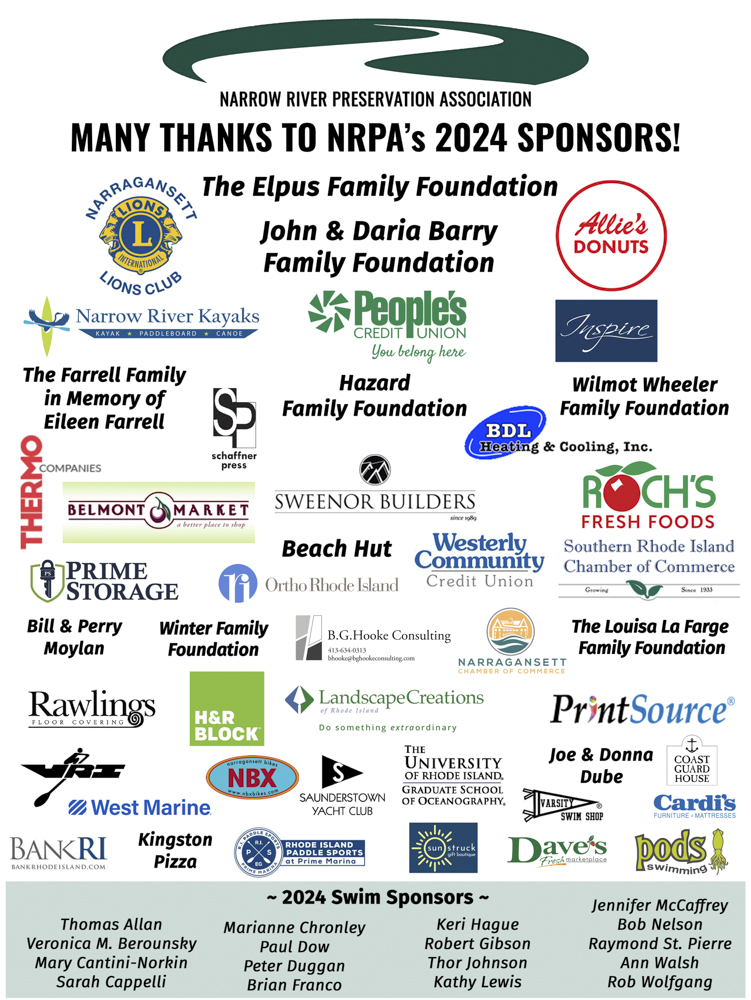
In 1972, Richard Barker Grant was invited to join the newly formed Narrow River Preservation Association (NRPA) to raise funds for the organization to protect the Narrow River. His first year on the Board of Directors, he planned two fundraising events: a canoe raffle and a canoe race. Grant smiles as he remembers that the NRPA Board of Directors wondered how to spend the $183 raised that year most wisely.
Since then, for more than 48 years, Grant has been the driving force behind all of NRPA’s many fundraisers, increasing NRPA membership, engaging local sponsors, connecting with benefactors and cultivating relationships with other stakeholders. Grant has been instrumental in organizing NRPA’s Annual Road Race, run for 31 consecutive years, the Narrow River Turnaround Swim, the Pettaquamscutt Paddle and all NRPA events.

Grant says that he is proud of NRPA’s accomplishments in protecting the river. Involved in every residential development in the watershed since 1970, NRPA has fought for responsible building, proper sewage and septic infrastructure, and commitment from the towns of Narragansett, North Kingstown and South Kingstown in the health of the river. Grant regards the findings of improved water quality in Narrow River over the past 30 years of NRPA’s River Watch program as an indicator that the efforts of NRPA have been successful.
On May 7, 2019 at the National Wetlands Awards Ceremony in Washington D.C., the Environmental Law Institute (ELI) honored long time NRPA President Richard Grant with a Lifetime Achievement Award.
In honor of his 47 years of dedication to Narrow River and Narrow River Preservation Association, Richard Grant was awarded the 2020 Blueways Stewardship Award by the Rhode Island Blueways Alliance.
NRPA Treasurer Ken McShane notes that under Grant’s leadership, NRPA has become a resource for agencies and organizations who need information about Narrow River. Those include the US Fish and Wildlife Service, municipal governments, Coastal Resources Management Council and State and Federal entities.

Recently, the Rhode Island Department of Environmental Management (RIDEM) was tasked with developing a watershed plan for each watershed in the state. Because there has been so much research and interest in the Narrow River Watershed, and because there is so much dedicated local involvement, RIDEM decided to develop the Narrow River Watershed Plan as one of their first plans. RIDEM and NRPA have collaborated on the plan, which is nearing completion. Once the Watershed Plan is published, NRPA will spearhead efforts to put the plan into action.
“It’s rewarding to see NRPA’s educational program. The Board [of Directors] and community contribute to having young children participate in learning about the environment at What Lives in the River [NRPA’s river exploration event]” says Grant. “Just seeing young scientists discovering and questioning is amazing.”
Educational initiatives including What Lives in the River, NRPA’s osprey education program, Lesa Meng College Scholarships and Science Fair Awards have all been developed during Grant’s tenure as NRPA President. Always open to new ideas, Grant has welcomed these and other programs, including Art on the River, the Narrow River Turnaround Swim and the Pettaquamscutt Paddle.

Those who know Grant admire his unique ability to build bridges, even among opposing forces. Dr. Veronica Berounsky, Vice President of NRPA, remembers a very contentious meeting a few years ago that included irate comments and angry outbursts. As people were leaving the meeting, Grant approached a person who had expressed anger at NRPA’s actions and invited him to get coffee together the following day. They did go for coffee and have been partners since.
Grant’s leadership has shaped Narrow River Preservation Association. As President of the Board of Directors, Grant’s guiding philosophy is that each board member should have a project or two that they lead with the support of the other members of the board of directors. Board members are welcome to support any event or initiative that interests them. In this way, each member has a sense of ownership over their project and no single member is expected to carry the entire organization. Berounsky says, “Richard has been my mentor as a Board Chair. In my work as the Chair of the Rhode Island Rivers Council, I have used Richard’s model with great success.”
The only exception to Grant’s model is that he himself is involved in every aspect of NRPA. His leadership provides a consistent thread throughout NRPA activities and actions. Always considering how each initiative fits into NRPA’s mission, Grant keeps the organization focused and actively working on each initiative at all times.
Asked what has kept him going for 46 years, Grant reflects “Personally I just really feel great that I’m improving the environment by being part of NRPA. While it is a small contribution, my work through NRPA is paying back people who have had the same sense and contributed to the environment, making my life better.”
Born and raised in Cranston, RI, Grant earned a BA from Brown University. He developed the position of Art Director at Interlaken Mills, acquired a partial ownership in the Cambridge Paper Box Company, which led to his a successful founding of a packaging company, R. B. Grant and Associates, servicing national publishers until he retired in 2015. He has two children and three grandchildren. Grant and his wife Jan have lived in Kingston since 1968. In addition to his work with NRPA, Grant is a prolific artist working in watercolors and oils and his own creation of Mic-a-rt. He loves to ski and is active in the Kingston social clubs.

In 2018, NRPA created an Endowment in Grant’s name. The permanent endowment will be managed by The Rhode Island Foundation and provide yearly grants for the benefit of the Narrow River Watershed.
The Rhode Island Foundation manages four other endowments for NRPA, all started with generous donations from NRPA supporters and their friends and family. Each of the four funds is named for their benefactor: John Elder Dick, Carl Otto, John Gormley and Rob Leeson. Based on the growth of the investment, each fund provides an annual grant to NRPA and grows according to the market growth. The endowments are protected and can only be used to benefit the environment.






